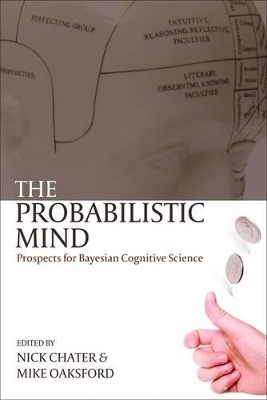
The Probabilistic Mind
Oxford University Press (Verlag)
978-0-19-921609-3 (ISBN)
'The Probabilistic Mind' is a follow-up to the influential and highly cited 'Rational Models of Cognition' (OUP, 1998). It brings together developments in understanding how, and how far, high-level cognitive processes can be understood in rational terms, and particularly using probabilistic Bayesian methods. It synthesizes and evaluates the progress in the past decade, taking into account developments in Bayesian statistics, statistical analysis of the cognitive 'environment' and a variety of theoretical and experimental lines of research. The scope of the book is broad, covering important recent work in reasoning, decision making, categorization, and memory. Including chapters from many of the leading figures in this field,
'The Probabilistic Mind' will be valuable for psychologists and philosophers interested in cognition.
Nick Chater is Professor of Cognitive and Decision Sciences at University College London. He has an M.A. in Psychology from Cambridge University, and a PhD in Cognitive Science from Edinburgh. He has held academic appointments at Edinburgh, Oxford, and Warwick Universities. His research focussed on attempting to find general principles that may be applicable across many cognitive domains, ranging from reasoning and decision making, to language acquisition and processing, to perception and categorization. Since the late 1980s, in collaboration with Mike Oaksford, he has been interested in the application of probabilistic and information-theoretic methods for understanding human reasoning. Mike Oaksford is Professor of Psychology and Head of School at Birkbeck College London. He was a research fellow at the Centre for Cognitive Science, University of Edinburgh, he was then lecturer at the University of Wales, Bangor, and senior lecturer at the University of Warwick, before moving to Cardiff University in 1996 as Professor of Experimental Psychology, a post he held until 2005. His research interests are in the area of human reasoning and decision making. In particular, with his colleague Nick Chater, he has been developing a Bayesian probabilistic approach to deductive reasoning tasks. According to this approach reasoning "biases" are the result of applying the wrong normative model and failing to take account of people's normal environment. He also studies the way the emotions affect and interact with reasoning and decision making processes.
PART I - FOUNDATIONS ; 1. The probabilistic mind: prospects for a Bayesian cognitive science ; 2. Technical introduction: a primer on probabilistic inference ; 3. Rational analyses, instrumentalism, and implementations ; PART II - INFERENCE AND ARGUMENT ; 4. Framing effects and rationality ; 5. Probability logic and the 'Modus Ponens - Modus Tollens' asymmetry ; 6. Inference from absence in language and thought ; 7. Towards a rational theory of human information acquisition ; 8. Pseudocontingencies: a key paradigm for understanding adaptive cognition ; PART III - JUDGEMENT AND DECISION-MAKING ; 9. Probabilistic minds, Bayesian brains, and cognitive mechanisms: harmony or dissonance ; 10. The game of life: how small samples render choice simple ; 11. The naive intuitive statistician: organism-environment relations from yet another angle ; 12. A decision-by-sampling account of decision under risk ; 13. The neurodynamics of choice, value-based decisions and preference reversal ; PART IV - CATEGORIZATION AND MEMORY ; 14. Categorization as nonparametric Bayesian density estimation ; 15. Rational analysis as a link between human memory and information retrieval ; 16. Causality in time: explaining away the future and the past ; 17. Compositionality in rational analysis: grammar-based induction for concept learning ; PART V - LEARNING ABOUT CONTINGENCY AND CAUSALITY ; 18. Through the looking-glass: a dynamic lens model approach to learning in MCPL tasks ; 19. Semi-rational models of conditioning: the case of trial order ; 20. Causal learning in rats and humans: a minimal rational model ; 21. The value of rational analysis: an assessment of causal reasoning and learning ; 22. Conclusion: where next?
| Erscheint lt. Verlag | 27.3.2008 |
|---|---|
| Zusatzinfo | 78 line figures |
| Verlagsort | Oxford |
| Sprache | englisch |
| Maße | 156 x 235 mm |
| Gewicht | 806 g |
| Themenwelt | Geisteswissenschaften ► Philosophie ► Logik |
| Geisteswissenschaften ► Psychologie ► Allgemeine Psychologie | |
| Geisteswissenschaften ► Psychologie ► Test in der Psychologie | |
| Geisteswissenschaften ► Psychologie ► Verhaltenstherapie | |
| Naturwissenschaften ► Biologie ► Zoologie | |
| ISBN-10 | 0-19-921609-6 / 0199216096 |
| ISBN-13 | 978-0-19-921609-3 / 9780199216093 |
| Zustand | Neuware |
| Haben Sie eine Frage zum Produkt? |
aus dem Bereich


